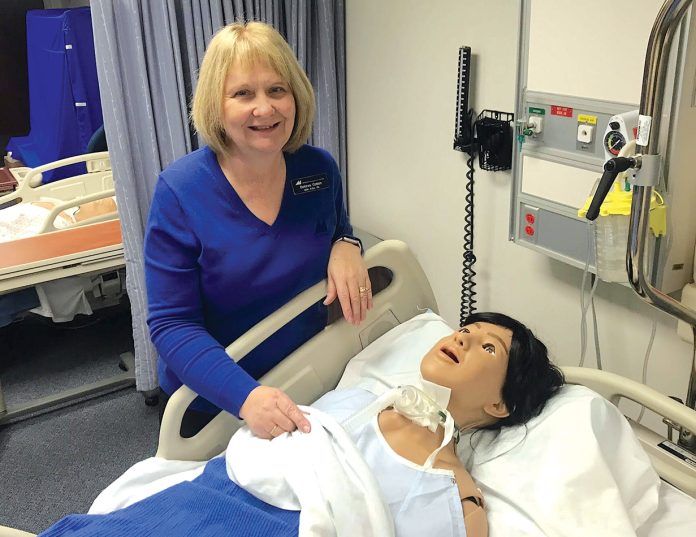by James Coburn, Staff Writer
The new year will mark a special anniversary for Delores Cotton, RN, practical nursing coordinator at Meridian Technology Center, located in Stillwater. She will celebrate her 30th year as an instructor there.
“It’s a wonderful place to work. It’s like a family, everybody helps each other out. We care for each other, celebrate successes and understand losses and things like that. It’s a pleasure to come to work every day,” Cotton said. “I know I can balance my home life and my work life here, and it’s just been a positive experience.”
She likes the people she works with and the facility, she said. Thirty-three nursing students comprise the cohorts designed to train licensed practical nurses upon their graduation from Meridian Technology Center. Meridian Technology Center is a 12-month program that teaches all aspects of being a safe and confident LPN. Some schools offer 18-month programs. Students in the Stillwater 12-month program need to complete some prerequisites before enrolling at Meridian Technology Center. (STORY CONTINUES BELOW)
Because the program is for adults, high school graduates who have completed the health careers course have earned the prerequisites to enter the program.
The faculty consists of three instructors and the LPN nursing coordinator.
There are nine theory classes and four clinical classes. Students are eligible to take the licensure exam upon their completion of the program. Graduates earn the credential of LPN after passing the test.
Last year’s passing rate was 94 percent. But there have been several years of 100 percent passage. Cotton said students at Meridian Technology Center typically score above the national and state average. The records are based on the first-time students taking the test. Most students will pass the test on their second attempt if they do not pass it on their first attempt. Passing the test after two attempts does not go on the record by the board of nursing, Cotton said.
“It’s very rewarding for me when a student comes back and tells me what they’re doing and how they’re growing in nursing,” she said. “They are appreciative of what we’ve taught them. It’s just very self-fulfilling for me.”
Many LPNs work in nursing homes, hospitals, public health, hospice, home health and all kinds of places, she said. The LPN became more in demand during the COVID crisis.
“Our students are getting more opportunities for employment in lots of different places. Within these last few years, the opportunities for LPNs have really risen,” Cotton said.
Being an LPN offers a stable career with a range of opportunities to advance in a career. Some LPNs advance as registered nurses. Many nurse practitioners began their careers as licensed practical nurses.
“You can stay as an LPN and you can even grow in what you do as an LPN, like being an assistant director of nurses at a long-term care facility,” Cotton continued. “Some of them do school nursing or do things in education as an LPN.”
Her career as a registered nurse began in the medical surgical unit at Stillwater Medical Center before moving to the maternal unit to care for mothers and their babies.
“And then I was a nursing supervisor. So, I was all over the hospital before I came here,” she said.
She credits her mother with inspiring her career. Her mother always sought to help others in life by putting them first. Cotton always wanted to become a teacher or a nurse.
“I wanted to do that. I wanted to help other people and make a difference in people’s lives,” she said.
Cotton earned her Master of Science in Adult Education degree at Oklahoma State University. She also earned a Master of Science in Nursing Education at the University of Oklahoma.
Technology has brought change to the nursing industry during her 30 years at Meridian Technology Center. She finds that students are more apt to want to use technology in their curriculum. So, Meridian Technology Center has adapted to the need for the latest electronic resources as well as traditional textbooks. The internet has made information more accessible.
“The equipment they use in clinical areas has changed so much,” Cotton said. “I think obviously students are at least a little bit more aware of what goes on in healthcare now than we were 30 years ago.”
Some things have remained the same but the way it’s delivered is different. Teaching students requires instructors to adapt to the difference in generations. Younger students prefer electronic communication such as conversing by text or email.
“Back in the day we called everyone on the phone to talk to them that way,” Cotton said. “But now we’re going to use different types of communication.”
A mentorship program is available to help students between the two cohorts. Older students will mentor younger students. As older students graduate, the mentee becomes a mentor.
The programs have been successful with positive interaction.
Cotton loves the moments when students who have been struggling suddenly absorb what it takes to be an LPN.
“You kind of see the light bulb go on. They’re understanding now and that’s definitely a big thing for me, too,” she said. “I’m very proud of them when they work hard, and they are able to meet their goals.”
For more information about Meridian Technology Center visit: http://meridiantech.edu/major/practical-nursing/













